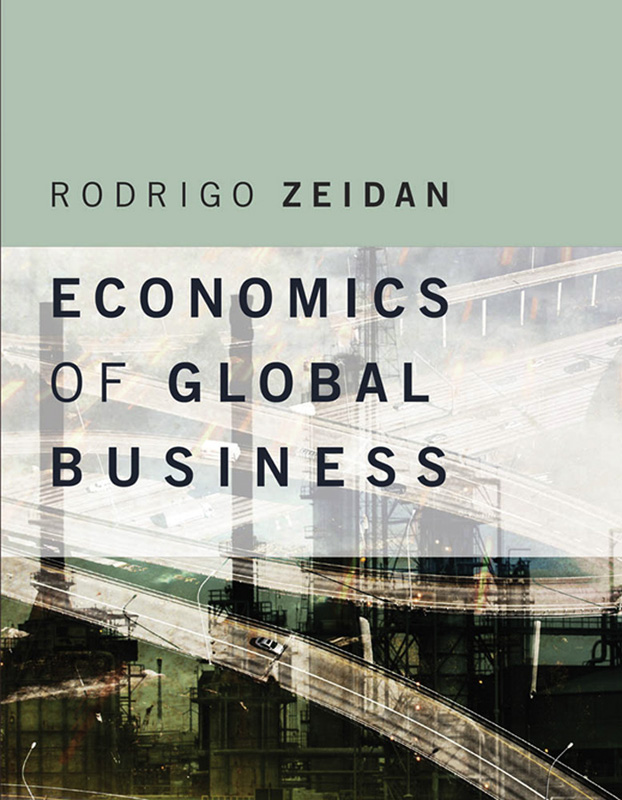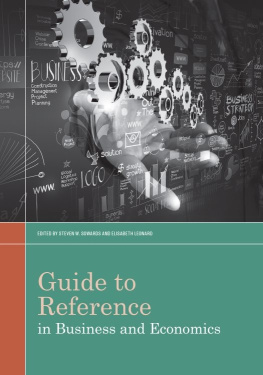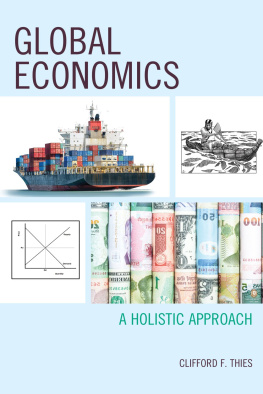Zeidan Rodrigo - Economics of Global Business
Here you can read online Zeidan Rodrigo - Economics of Global Business full text of the book (entire story) in english for free. Download pdf and epub, get meaning, cover and reviews about this ebook. year: 2018, publisher: MIT Press, genre: Politics. Description of the work, (preface) as well as reviews are available. Best literature library LitArk.com created for fans of good reading and offers a wide selection of genres:
Romance novel
Science fiction
Adventure
Detective
Science
History
Home and family
Prose
Art
Politics
Computer
Non-fiction
Religion
Business
Children
Humor
Choose a favorite category and find really read worthwhile books. Enjoy immersion in the world of imagination, feel the emotions of the characters or learn something new for yourself, make an fascinating discovery.

- Book:Economics of Global Business
- Author:
- Publisher:MIT Press
- Genre:
- Year:2018
- Rating:3 / 5
- Favourites:Add to favourites
- Your mark:
- 60
- 1
- 2
- 3
- 4
- 5
Economics of Global Business: summary, description and annotation
We offer to read an annotation, description, summary or preface (depends on what the author of the book "Economics of Global Business" wrote himself). If you haven't found the necessary information about the book — write in the comments, we will try to find it.
Economics of Global Business — read online for free the complete book (whole text) full work
Below is the text of the book, divided by pages. System saving the place of the last page read, allows you to conveniently read the book "Economics of Global Business" online for free, without having to search again every time where you left off. Put a bookmark, and you can go to the page where you finished reading at any time.
Font size:
Interval:
Bookmark:

2018 Massachusetts Institute of Technology
All rights reserved. No part of this book may be reproduced in any form by any electronic or mechanical means (including photocopying, recording, or information storage and retrieval) without permission in writing from the publisher.
This book was set in Palatino by Toppan Best-set Premedia Limited. Printed and bound in the United States of America.
Library of Congress Cataloging-in-Publication Data
Names: Zeidan, Rodrigo, author.
Title: Economics of global business / Rodrigo Zeidan.
Description: Cambridge, MA : MIT Press, [2018] | Includes bibliographical
references and index.
Identifiers: LCCN 2017058666 | ISBN 9780262535625 (pbk. : alk. paper)
eISBN 9780262347389
Subjects: LCSH: Economic development. | International economic relations. |
Economic policy. | Monetary policy.
Classification: LCC HD82 .Z45 2018 | DDC 338.88--dc23 LC record available at https://lccn.loc.gov/2017058666
ePub Version 1.0
d_r0
Preface
When I was a kid in the 1980s in Brazil, I had a job to do once every month. My task was to rush around our local supermarket and toss items on my mothers list into a cart, trying to keep one step ahead of employees armed with price guns who regularly marked up prices on the day my mom received her paycheck. The goal was to spend 60% of the check on nonperishable groceries that would last us through the month. It was a time of hyperinflation in Brazil, and as a youngster, I was experiencing firsthand many effects of inept economic policies. Now, as an adult, I regularly spend one summer month in Denmark, where problems are those of a developed country, and most of the year in China, literally breathing in the implications of global policymaking along with millions of others who choke on air polluted for the sake of industrial development.
Books are often propelled into life by underlying tensions between conflicting ideas, ideologies, or identities. This book has been borne out of several types of conflictthat between theory and practice, rigor and narrative, convention and unfamiliarity, emergence and development, and nationalization and globalization. But perhaps the most important disparity is the one between what is and what ought to be. Economists invited to work for governments soon notice that public authorities rarely address problems by using the most efficient pathswhat we call first-best solutions. In real life, third-best, fourth-best, or even downright spurious policies are the norm, with first-best solutions as the rare exceptions. Many economic textbooks are concerned with what the policies ought to be, but few examine the actual policies as they are, complete with all their tradeoffs and unintended consequences. This goes beyond a clash between theories and practice. It touches on ideology. I trust science over ideology. This trust is not naive. I know that even the choice of a research question is often the result of political decisions. That notwithstanding, economic theory provides testable hypotheses that are refined over time. Theoretical breakthroughs do happen. And in the end, empirical works broaden our understanding of economic processes.
It is impossible for all these conflicts to be resolved. Some authors favor theory over practice, and others look for a rigorous approach. But even though there is no shortage of books on economy, I have never found one I was entirely comfortable with when teaching macroeconomics and the global economy to business students. Some focus mostly on the United States, others are too technical for my typical audience, and a few are out of touch with the real world. There is nothing wrong with most of the economics textbooks in the market. Other authors simply choose a different path than the one taken in the book you are holding in your hands or reading on your electronic device.
I decided to write a nontechnical manual of public policy that has examples from all over the world and presents all the difficult tradeoffs that policymakers face. The book can be used by students in emerging and developed countries alike, and, most important, should be engaging. Dry technical manuals sometimes are inevitable, but that is definitely not the case for economics textbooks. We are inundated with news regarding the choices made by public authorities: Will the Federal Reserve hike the target interest rate? Will the Japanese public deficit increase yet again? Should the Argentinian authorities sell foreign currency to prop up the peso? There is plenty of real-life material to keep the average reader interested.
If there is one ideology I developed throughout my career and by experiencing the contradictions in all the countries I have lived, then it is radical skepticism. I am uncomfortable with simplistic thinking. We live in a world in which most people seek easy answers to complex issues. Political discourse is full of extreme arguments that focus entirely on costs or benefits but rarely takes a nuanced approach that balances the two. When people favor policy A, then they highlight only its benefits to society. The narrative trumps facts. That is not the case here. Economic systems also need to be thought about in dynamic terms. This requires that the evolution of the economy should be taken into account when we develop arguments pro and contra certain policies.
There are no easy solutions. Economic policy is context-dependent. Textbooks today must address issues like income inequality and the impact of the great financial crisis, innovative policies like quantitative easing and negative interest rates, and climate change. True development, where people are not left behind and we do not destroy the environment, is extremely hard. And it takes time.
The book follows a straightforward structure with one exception: the main details regarding the social outcomes of economic policy are at the end of the book, instead of the beginning. I chose to do it this way because I have found that going over the precise definitions of gross domestic product (GDP), inflation, income inequality, and unemployment in the first few weeks of a macroeconomics introductory course alienates some students. I have found it more useful to return to these definitions after we understand how these outcomes are determined in distinct macroeconomic markets and how policies affect social welfare. One does not need to know right away that GDP includes only final goods and services to understand that economic growth is a relevant social outcome.
Other than this, the structure of the book is quite conventional. The first part deals with closed national economies, and the second part integrates the national economy with the rest of the world. Monetary and fiscal policies are described in the first part of the book and are revisited, alongside currency management, in the second part. The last chapter integrates all the macromarkets in a comprehensive framework that allows readers to analyze the impact of an economic shock through all the markets and evaluate the possible consequences of a reaction by public authorities.
Given that the detailed definitions of social outcomes come only in chapter 14, readers can read chapters 1 and 14 before reading the rest of the book if that sequence works better for them rather than reading chapters consecutively.
In addition to this book, instructors have access to all the materials necessary to teach a course based on the book. Slides that highlight the main points of each chapter, additional case studies, and exam and review questions are provided so that the book can function as an introductory or intermediary macro and international economics course for undergraduate or graduate students. The book also can be used as a complement to more technical manuals, illustrating concepts and models with real-life examples.
Font size:
Interval:
Bookmark:
Similar books «Economics of Global Business»
Look at similar books to Economics of Global Business. We have selected literature similar in name and meaning in the hope of providing readers with more options to find new, interesting, not yet read works.
Discussion, reviews of the book Economics of Global Business and just readers' own opinions. Leave your comments, write what you think about the work, its meaning or the main characters. Specify what exactly you liked and what you didn't like, and why you think so.









